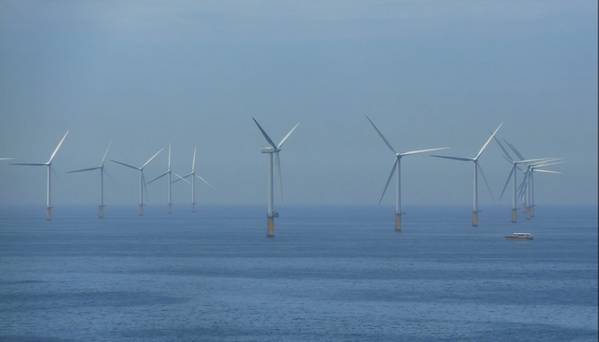
Germany boosted its offshore wind power capacity last year, topping its own targets, as Europe's largest economy drives its push into renewables, data from grid company TenneT GmbH showed on Wednesday.
The Berlin government has raised offshore capacity targets to 20,000 MW by 2030 in recognition of the immense role that offshore wind will play in the decarbonization of electricity generation.
Last year offshore wind power operators in the German North Sea increased capacity by 3.4% to 6,679 megawatts (MW), TenneT said, overshooting an interim government target for 2020 of 6,500 MW.
Overall, German power production from North Sea wind farms increased by 12.6% to 22.76 terawatt-hours (TWh) last year, while those in the Baltic Sea provided 4.1 TWh and onshore wind power 105.4 TWh, TenneT said.
As the German arm of the Dutch transmission network group TenneT Holding BV <IPO-TTH.AS>, TenneT GmbH is responsible for linking North Sea wind farms to onshore high-voltage transmission grids in the German states of Lower Saxony and Schleswig Holstein.
It operates platforms and converter stations to turn the direct current from offshore turbines into alternating current for onshore power systems, and transports power to Germany's industrial south.
Its German North Sea connection capacity to onshore, which stood at 7,132 MW last year, will reach 17,000 MW by the end of the decade, it said.
Its parent company will meanwhile increase Dutch offshore connection capacity to 9,600 MW by 2030 from 1,400 MW currently.
TenneT's German sector peer Amprion also plans to add connections on the North Sea coast, while 50Hertz handles Baltic Sea connections.
TenneT GmbH said there will be 1,000 km of additional onshore power lines in its area by 2030.
By that date, Germany must achieve the best possible integration into its grids of emerging electrolysis plants aimed at producing hydrogen from green electricity as an alternative fuel, it demanded.
German grid companies refinance their investments with income from regulated network tariffs.
(Reporting by Vera Eckert, editing by Kirsten Donovan)